26 releases (8 breaking)
| 0.9.1 | Apr 9, 2025 |
|---|---|
| 0.9.0 | Mar 31, 2025 |
| 0.8.0 | Mar 17, 2025 |
| 0.6.0 | Dec 15, 2024 |
| 0.1.1 | Jun 26, 2022 |
#57 in Command-line interface
557 downloads per month
Used in 12 crates
255KB
5.5K
SLoC
promkit
A toolkit for building your own interactive prompt in Rust.
Getting Started
Put the package in your Cargo.toml.
[dependencies]
promkit = "0.9.1"
Features
- Cross-platform support for both UNIX and Windows utilizing crossterm
- Modularized architecture
- promkit-core
- Core functionality for basic terminal operations and pane management
- promkit-widgets
- Various UI components (text, listbox, tree, etc.)
- promkit
- High-level presets and user interfaces
- promkit-derive
- A Derive macro that simplifies interactive form input
- promkit-core
- Rich preset components
- Readline - Text input with auto-completion
- Confirm - Yes/no confirmation prompt
- Password - Password input with masking and validation
- Form - Manage multiple text input fields
- Listbox - Single selection interface from a list
- QuerySelector - Searchable selection interface
- Checkbox - Multiple selection checkbox interface
- Tree - Tree display for hierarchical data like file systems
- JSON - Parse and interactively display JSON data
- Text - Static text display
Concept
See here.
Projects using promkit
Examples/Demos
promkit provides presets so that users can try prompts immediately without having to build complex components for specific use cases.
Show you commands, code, and actual demo screens for examples that can be executed immediately below.
Readline
Command
cargo run --bin readline --manifest-path examples/readline/Cargo.toml
Code
use promkit::{preset::readline::Readline, suggest::Suggest};
fn main() -> anyhow::Result<()> {
let mut p = Readline::default()
.title("Hi!")
.enable_suggest(Suggest::from_iter([
"apple",
"applet",
"application",
"banana",
]))
.validator(
|text| text.len() > 10,
|text| format!("Length must be over 10 but got {}", text.len()),
)
.prompt()?;
println!("result: {:?}", p.run()?);
Ok(())
}
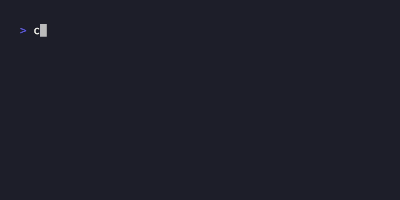
Confirm
Command
cargo run --manifest-path examples/confirm/Cargo.toml
Code
use promkit::preset::confirm::Confirm;
fn main() -> anyhow::Result<()> {
let mut p = Confirm::new("Do you have a pet?").prompt()?;
println!("result: {:?}", p.run()?);
Ok(())
}
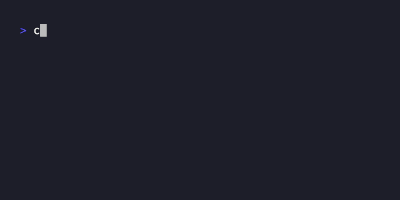
Password
Command
cargo run --manifest-path examples/password/Cargo.toml
Code
use promkit::preset::password::Password;
fn main() -> anyhow::Result<()> {
let mut p = Password::default()
.title("Put your password")
.validator(
|text| 4 < text.len() && text.len() < 10,
|text| format!("Length must be over 4 and within 10 but got {}", text.len()),
)
.prompt()?;
println!("result: {:?}", p.run()?);
Ok(())
}
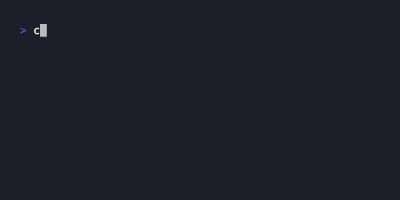
Form
Command
cargo run --manifest-path examples/form/Cargo.toml
Code
use promkit::{
crossterm::style::{Color, ContentStyle},
preset::form::Form,
promkit_widgets::text_editor,
};
fn main() -> anyhow::Result<()> {
let mut p = Form::new([
text_editor::State {
prefix: String::from("❯❯ "),
prefix_style: ContentStyle {
foreground_color: Some(Color::DarkRed),
..Default::default()
},
active_char_style: ContentStyle {
background_color: Some(Color::DarkCyan),
..Default::default()
},
..Default::default()
},
text_editor::State {
prefix: String::from("❯❯ "),
prefix_style: ContentStyle {
foreground_color: Some(Color::DarkGreen),
..Default::default()
},
active_char_style: ContentStyle {
background_color: Some(Color::DarkCyan),
..Default::default()
},
..Default::default()
},
text_editor::State {
prefix: String::from("❯❯ "),
prefix_style: ContentStyle {
foreground_color: Some(Color::DarkBlue),
..Default::default()
},
active_char_style: ContentStyle {
background_color: Some(Color::DarkCyan),
..Default::default()
},
..Default::default()
},
])
.prompt()?;
println!("result: {:?}", p.run()?);
Ok(())
}
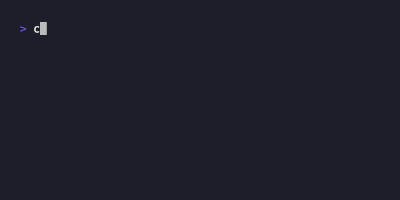
Listbox
Command
cargo run --manifest-path examples/listbox/Cargo.toml
Code
use promkit::preset::listbox::Listbox;
fn main() -> anyhow::Result<()> {
let mut p = Listbox::new(0..100)
.title("What number do you like?")
.prompt()?;
println!("result: {:?}", p.run()?);
Ok(())
}
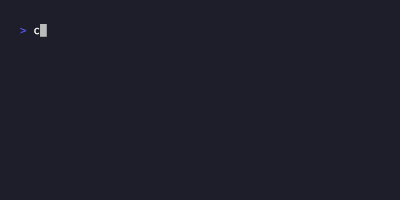
QuerySelector
Command
cargo run --manifest-path examples/query_selector/Cargo.toml
Code
use promkit::preset::query_selector::QuerySelector;
fn main() -> anyhow::Result<()> {
let mut p = QuerySelector::new(0..100, |text, items| -> Vec<String> {
text.parse::<usize>()
.map(|query| {
items
.iter()
.filter(|num| query <= num.parse::<usize>().unwrap_or_default())
.map(|num| num.to_string())
.collect::<Vec<String>>()
})
.unwrap_or(items.clone())
})
.title("What number do you like?")
.listbox_lines(5)
.prompt()?;
println!("result: {:?}", p.run()?);
Ok(())
}
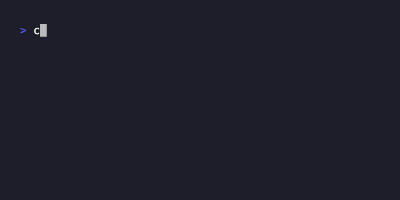
Checkbox
Command
cargo run --manifest-path examples/checkbox/Cargo.toml
Code
use promkit::preset::checkbox::Checkbox;
fn main() -> anyhow::Result<()> {
let mut p = Checkbox::new(vec![
"Apple",
"Banana",
"Orange",
"Mango",
"Strawberry",
"Pineapple",
"Grape",
"Watermelon",
"Kiwi",
"Pear",
])
.title("What are your favorite fruits?")
.checkbox_lines(5)
.prompt()?;
println!("result: {:?}", p.run()?);
Ok(())
}
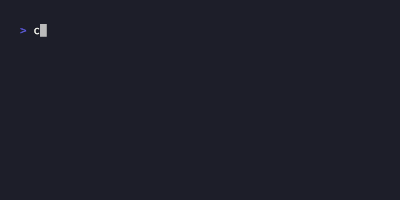
Tree
Command
cargo run --manifest-path examples/tree/Cargo.toml
Code
use promkit::{preset::tree::Tree, promkit_widgets::tree::node::Node};
fn main() -> anyhow::Result<()> {
let mut p = Tree::new(Node::try_from(&std::env::current_dir()?.join("src"))?)
.title("Select a directory or file")
.tree_lines(10)
.prompt()?;
println!("result: {:?}", p.run()?);
Ok(())
}
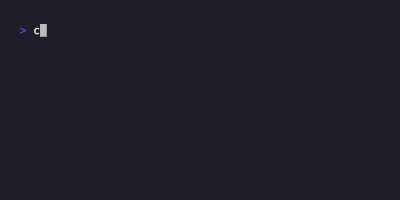
JSON
Command
cargo run --manifest-path examples/json/Cargo.toml
Code
use promkit::{
preset::json::Json,
promkit_widgets::{
jsonstream::JsonStream,
serde_json::{self, Deserializer},
},
};
fn main() -> anyhow::Result<()> {
let stream = JsonStream::new(
Deserializer::from_str(
r#"
{
"apiVersion": "v1",
"kind": "Pod",
"metadata": {
"annotations": {
"kubeadm.kubernetes.io/etcd.advertise-client-urls": "https://172.18.0.2:2379",
"kubernetes.io/config.hash": "9c4c3ba79af7ad68d939c568f053bfff",
"kubernetes.io/config.mirror": "9c4c3ba79af7ad68d939c568f053bfff",
"kubernetes.io/config.seen": "2024-10-12T12:53:27.751706220Z",
"kubernetes.io/config.source": "file"
},
"creationTimestamp": "2024-10-12T12:53:31Z",
"labels": {
"component": "etcd",
"tier": "control-plane"
},
"name": "etcd-kind-control-plane",
"namespace": "kube-system",
"ownerReferences": [
{
"apiVersion": "v1",
"controller": true,
"kind": "Node",
"name": "kind-control-plane",
"uid": "6cb2c3e5-1a73-4932-9cc5-6d69b80a9932"
}
],
"resourceVersion": "192988",
"uid": "77465839-5a58-43b1-b754-55deed66d5ca"
},
"spec": {
"containers": [
{
"command": [
"etcd",
"--advertise-client-urls=https://172.18.0.2:2379",
"--cert-file=/etc/kubernetes/pki/etcd/server.crt",
"--client-cert-auth=true",
"--data-dir=/var/lib/etcd",
"--experimental-initial-corrupt-check=true",
"--experimental-watch-progress-notify-interval=5s",
"--initial-advertise-peer-urls=https://172.18.0.2:2380",
"--initial-cluster=kind-control-plane=https://172.18.0.2:2380",
"--key-file=/etc/kubernetes/pki/etcd/server.key",
"--listen-client-urls=https://127.0.0.1:2379,https://172.18.0.2:2379",
"--listen-metrics-urls=http://127.0.0.1:2381",
"--listen-peer-urls=https://172.18.0.2:2380",
"--name=kind-control-plane",
"--peer-cert-file=/etc/kubernetes/pki/etcd/peer.crt",
"--peer-client-cert-auth=true",
"--peer-key-file=/etc/kubernetes/pki/etcd/peer.key",
"--peer-trusted-ca-file=/etc/kubernetes/pki/etcd/ca.crt",
"--snapshot-count=10000",
"--trusted-ca-file=/etc/kubernetes/pki/etcd/ca.crt"
],
"image": "registry.k8s.io/etcd:3.5.15-0",
"imagePullPolicy": "IfNotPresent",
"livenessProbe": {
"failureThreshold": 8,
"httpGet": {
"host": "127.0.0.1",
"path": "/livez",
"port": 2381,
"scheme": "HTTP"
},
"initialDelaySeconds": 10,
"periodSeconds": 10,
"successThreshold": 1,
"timeoutSeconds": 15
},
"name": "etcd",
"readinessProbe": {
"failureThreshold": 3,
"httpGet": {
"host": "127.0.0.1",
"path": "/readyz",
"port": 2381,
"scheme": "HTTP"
},
"periodSeconds": 1,
"successThreshold": 1,
"timeoutSeconds": 15
},
"resources": {
"requests": {
"cpu": "100m",
"memory": "100Mi"
}
},
"startupProbe": {
"failureThreshold": 24,
"httpGet": {
"host": "127.0.0.1",
"path": "/readyz",
"port": 2381,
"scheme": "HTTP"
},
"initialDelaySeconds": 10,
"periodSeconds": 10,
"successThreshold": 1,
"timeoutSeconds": 15
},
"terminationMessagePath": "/dev/termination-log",
"terminationMessagePolicy": "File",
"volumeMounts": [
{
"mountPath": "/var/lib/etcd",
"name": "etcd-data"
},
{
"mountPath": "/etc/kubernetes/pki/etcd",
"name": "etcd-certs"
}
]
}
],
"dnsPolicy": "ClusterFirst",
"enableServiceLinks": true,
"hostNetwork": true,
"nodeName": "kind-control-plane",
"preemptionPolicy": "PreemptLowerPriority",
"priority": 2000001000,
"priorityClassName": "system-node-critical",
"restartPolicy": "Always",
"schedulerName": "default-scheduler",
"securityContext": {
"seccompProfile": {
"type": "RuntimeDefault"
}
},
"terminationGracePeriodSeconds": 30,
"tolerations": [
{
"effect": "NoExecute",
"operator": "Exists"
}
],
"volumes": [
{
"hostPath": {
"path": "/etc/kubernetes/pki/etcd",
"type": "DirectoryOrCreate"
},
"name": "etcd-certs"
},
{
"hostPath": {
"path": "/var/lib/etcd",
"type": "DirectoryOrCreate"
},
"name": "etcd-data"
}
]
},
"status": {
"conditions": [
{
"lastProbeTime": null,
"lastTransitionTime": "2024-12-06T13:28:35Z",
"status": "True",
"type": "PodReadyToStartContainers"
},
{
"lastProbeTime": null,
"lastTransitionTime": "2024-12-06T13:28:34Z",
"status": "True",
"type": "Initialized"
},
{
"lastProbeTime": null,
"lastTransitionTime": "2024-12-06T13:28:50Z",
"status": "True",
"type": "Ready"
},
{
"lastProbeTime": null,
"lastTransitionTime": "2024-12-06T13:28:50Z",
"status": "True",
"type": "ContainersReady"
},
{
"lastProbeTime": null,
"lastTransitionTime": "2024-12-06T13:28:34Z",
"status": "True",
"type": "PodScheduled"
}
],
"containerStatuses": [
{
"containerID": "containerd://de0d57479a3ac10e213df6ea4fc1d648ad4d70d4ddf1b95a7999d0050171a41e",
"image": "registry.k8s.io/etcd:3.5.15-0",
"imageID": "sha256:27e3830e1402783674d8b594038967deea9d51f0d91b34c93c8f39d2f68af7da",
"lastState": {
"terminated": {
"containerID": "containerd://28d1a65bd9cfa40624a0c17979208f66a5cc7f496a57fa9a879907bb936f57b3",
"exitCode": 255,
"finishedAt": "2024-12-06T13:28:31Z",
"reason": "Unknown",
"startedAt": "2024-11-04T15:14:19Z"
}
},
"name": "etcd",
"ready": true,
"restartCount": 2,
"started": true,
"state": {
"running": {
"startedAt": "2024-12-06T13:28:35Z"
}
}
}
],
"hostIP": "172.18.0.2",
"hostIPs": [
{
"ip": "172.18.0.2"
}
],
"phase": "Running",
"podIP": "172.18.0.2",
"podIPs": [
{
"ip": "172.18.0.2"
}
],
"qosClass": "Burstable",
"startTime": "2024-12-06T13:28:34Z"
}
}
"#,
)
.into_iter::<serde_json::Value>()
.filter_map(serde_json::Result::ok)
.collect::<Vec<_>>()
.iter(),
);
let mut p = Json::new(stream).title("JSON viewer").prompt()?;
println!("result: {:?}", p.run()?);
Ok(())
}
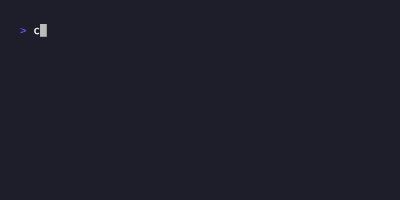
License
This project is licensed under the MIT License. See the LICENSE file for details.
Stargazers over time
Dependencies
~5–15MB
~200K SLoC
